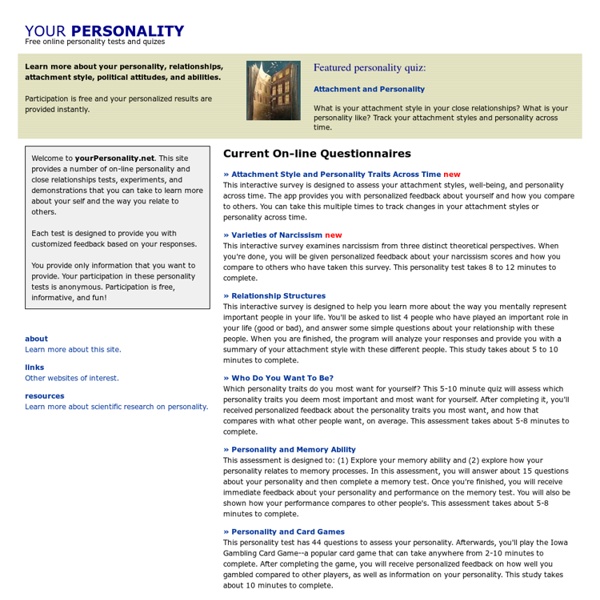



4 Mind-Blowing Personality Tests Pictures 1. Take a look at the image below. What do you see? 2. Focus on the following picture and give a quick answer: Which stairs will you use to go up and which to go down? 3. 4. 1. Note: This is a test for “dirty minds.” 2. 3. If you found him in about 1 minute, the right part of your brain is of the average person. If you needed more than 1 minute to find him, the right part of your brain is slow. 4. The right hemisphere represents people with artistic flair. If you can see both directions of rotation, you are likely to have an very high IQ level. © Copyright 2015 Learning Mind, all rights reserved. The following two tabs change content below. Anna is the owner and lead editor of the website Learning-mind.com.
Free Personality Test - Eerily Accurate - Learnmyself What Is CogniFit? - Mind Training Program Personality and Relationships Most of us are allured by the attractive notion that effortless relationships exist. Whether it be happily-ever-after marriages, or friendships that last forever, or parent/child bonds which supercede the need to understand each other, we'd all like to believe that our most intimate relationships are unconditional, and strong enough to withstand whatever may come. However, at some point in our lives most of us need to face the fact that relationships require effort to keep them strong and positive, and that even wonderful, strong relationships can be destroyed by neglect. Whether you're looking to improve a love relationship, familial relationships, friendships, or employer/employee relationships, understanding your own personality type and the personality type of the other person involved in the relationship will bring a new dynamic to the situation, which will allow better understanding and communication. The same cannot be said for other kinds of relationships.
Personality Test - 41 Questions. 1 Personality. 100% Free. Personality test — get to know your personality type in 41 Questions. The test is free of charge and requires no registration. It takes about five minutes to complete. Personality Test Question 1 of 41 In phoning do you: , or Previous Question Start over Help Personality Test Question 2 of 41 Do you prefer the: Personality Test Question 3 of 41 At parties, do you: Personality Test Question 4 of 41 Do you prefer: Personality Test Question 5 of 41 Which do you wish more for yourself: Personality Test Question 6 of 41 Facts: Personality Test Question 7 of 41 Are you more likely to trust your: Personality Test Question 8 of 41 In company do you: Personality Test Question 9 of 41 In doing ordinary things are your more likely to: Personality Test Question 10 of 41 Are you inclined to be: Personality Test Question 11 of 41 Do you prefer to work: Personality Test Question 12 of 41 When the phone rings do you: Personality Test Question 13 of 41 Do you see yourself as basically: Personality Test Question 14 of 41 Are you more:
HumanMetrics - online relationships, personality and entrepreneur tests, personal solution center Aptitude tests, Assesment & IQ Training – Aptitude tests online – Fibonicci PersonalDNA | Your True Self Revealed - Fast Fun Free Personality Tests Quizzes Quizzes Main-Celebs-Movies-TV-Music-Life-More [First] « Prev 1 2 3 4 5 6 7 8 9 Next » [Last] more quizzes » The free five minute personality test! Your Existing Situation Is feeling a large amount of stress due to her inability to achieve goals and her indecisiveness on how to go about changing the situation for the better. Your Stress Sources "is being overworked and her flexibility and hard work are being taken advantage of while trying to deal with problems. Your Restrained Characteristics Giving more than she is getting back and feels misunderstood and unappreciated. "Willing to become emotionally involved, but is demanding and picky when choosing a partner. Conceited and is easily insulted. Feels as if too many walls and obstacles are standing in her way and that she is being forced to make compromises. she needs to put her own needs on hold for the time being. Your Desired Objective Lives life to the fullest. Your Actual Problem Your Actual Problem #2
Personality Tests of Myers & Briggs' 16 Types Price: Free Basic Report | $29 Full Report This updated and expanded edition of our bestselling TypeFinder assessment goes deeper than any personality test you've taken before. Based on original research into the nuances of personality type, the TypeFinder reveals not only your four-letter personality type code, but exactly how your one-of-a-kind personality profile fits within that type. Your results answer questions like: How can I decide, once and for all, what my type is? The TypeFinder shows how the 23 facets of your personality make up your unique personality fingerprint. Take it!
personality styles, types, theories and psychometrics models, personality tests and quizzes theory personality models on this page The Four Temperaments/Four Humours Carl Jung's Psychological Types Myers Briggs® personality types theory (MBTI® model) Keirsey's personality types theory (Temperament Sorter model) Hans Eysenck's personality types theory Katherine Benziger's Brain Type theory William Moulton Marston's DISC personality theory (Inscape, Thomas Int., etc) Belbin Team Roles and personality types theory The 'Big Five' Factors personality model FIRO-B® Personality Assessment model The Birkman Method® Lumina Spark Morphopsychology Other personality theories and psychometrics tests models personality theories and models - introduction Behavioural and personality models are widely used in organisations, especially in psychometrics and psychometric testing (personality assessments and tests). Understanding personality - of your self and others - is central to motivation. The more you understand about personality, the better able you are to judge what motivates people - and yourself. N.B. N.B. and